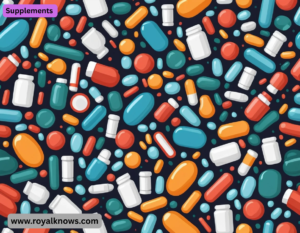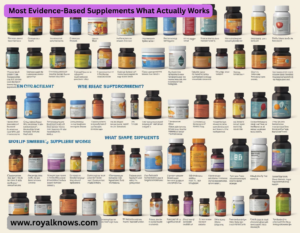Supplements Dietary supplements are products designed to provide nutrients that may be missing or insufficient in your diet. Here’s a breakdown of common supplements, their benefits, and considerations:

Common Types of Supplements:
- Vitamins – Essential for overall health (e.g., Vitamin D for bone health, Vitamin C for immunity).
- Minerals – Important for bodily functions (e.g., Iron for blood health, Magnesium for muscle function).
- Protein & Amino Acids – Supports muscle repair and growth (e.g., Whey protein, BCAAs).
- Omega-3 Fatty Acids – Promotes heart and brain health (found in fish oil).
- Probiotics – Supports gut health and digestion.
- Herbal Supplements – Derived from plants (e.g., Turmeric for inflammation, Echinacea for immunity).
- Pre-Workout & Performance Boosters – Often contain caffeine, creatine, or beta-alanine.
- Specialty Supplements – Such as collagen (for skin/joints) or melatonin (for sleep).
Potential Benefits:
- Fills nutritional gaps (e.g., vegans may need B12).
- Supports specific health goals (e.g., muscle gain, immune support).
- May improve energy, recovery, or sleep.
Risks & Considerations:
- Overconsumption – Some vitamins (like A, D, E, K) can be toxic in excess.
- Drug Interactions – Some supplements interfere with medications (e.g., St. John’s Wort with antidepressants).
- Quality Issues – Not all supplements are FDA-regulated; choose reputable brands (look for USP, NSF, or third-party tested).
- Not a Substitute for a Healthy Diet – Whole foods provide nutrients in their best form.
Who Might Need Supplements
- People with deficiencies (confirmed by blood tests).
- Pregnant women (folic acid, iron).
- Older adults (Vitamin D, B12).
- Athletes or those with high physical demands.
Most Evidence-Based Supplements What Actually Works
- Vitamin D – Crucial for immunity & bone health (especially if you get little sun).
- Magnesium – Helps with sleep (glycinate) and muscle cramps (citrate).
- Omega-3s (EPA/DHA) – Reduces inflammation; linked to heart and brain health.
- Probiotics (specific strains) – Lactobacillus and Bifidobacterium may improve gut health.
- Creatine Monohydrate – Gold standard for muscle strength and cognitive performance.
- Iron – Only if deficient (common in women with heavy periods).
Controversial/Overhyped:
- Collagen (may help skin/joints but evidence is mixed).
- Multivitamins (often unnecessary if diet is balanced).
- Fat burners (most are ineffective or unsafe).

2. Timing Matters: When to Take Supplements
- Night: Magnesium (sleep), Zinc (best absorbed away from iron).
- With Food: Fat-soluble vitamins (A, D, E, K), Omega-3s.
- Empty Stomach: Iron (with vitamin C for better absorption).
3. Hidden Risks & Interactions
- Calcium – May reduce absorption of antibiotics or thyroid meds.
- Antioxidants (like high-dose Vitamin E) – Might blunt workout gains by reducing oxidative stress (which triggers adaptation).
- “Natural” ≠ Safe – Herbal supplements (e.g., kava, comfrey) can harm the liver.
4. How to Choose a Quality Supplement
- Avoid proprietary blends (doses hidden).
- Check for unnecessary fillers (titanium dioxide, artificial colors).
- Example trusted brands: Thorne, Pure Encapsulations, NOW, Legion Athletics.
5. Special Cases
- ForVegans: B12, Algae-based DHA, Iron (if low).
- For Menopause: Black cohosh may help hot flashes (but research is mixed).
- For PCOS: Inositol, Berberine (supports insulin sensitivity).
- For Anxiety: L-Theanine (from green tea), adaptogens like Ashwagandha (limited evidence).
6. The Placebo Effect & Marketing Hype
- Many supplements (e.g., “testosterone boosters”) rely on clever marketing. Ask:
- Is there human research backing this?
- Could I get this from food instead?
7. Blood Testing: The Only Way to Know
Before supplementing long-term, test for:
- Vitamin D
- Ferritin (iron stores)
- B12
- Magnesium RBC (more accurate than serum).
Bioavailability Hacks: Maximizing Absorption
- Fat-Soluble Vitamins (A/D/E/K): Take with avocado, nuts, or olive oil for 30-50% better absorption.
- Curcumin (Turmeric): Pair with black pepper (piperine) or phospholipids (Meriva/BCM-95 formulations) to boost bioavailability 20x.
- Use “heme iron” (from meat) or “iron bisglycinate” for fewer side effects.
- Pro Tip: Some forms are useless—avoid magnesium oxide (only 4% absorbed).

2. The Gut-Microbiome Connection
- Prebiotics > Probiotics: Feed good bacteria with fiber (resistant starch, inulin) instead of relying solely on probiotic pills.
- Spore-Based Probiotics (e.g., Bacillus coagulans): Survive stomach acid better than Lactobacillus.
- Warning: Overdoing probiotics can cause “brain fog” or bloating in some (SIBO risk).
3. Hormonal & Longevity Supplements (Emerging Science)
- Nicotinamide Riboside (NR) / NMN: Boosts NAD+ for cellular repair, but human data is still early.
- Apigenin (from chamomile): Mimics caloric restriction—may extend lifespan in animal studies.
- Berberine: Called “nature’s Ozempic,” but can disrupt gut microbiota long-term.
- DHEA & Pregnenolone: Hormone precursors with risks (may increase estrogen/testosterone unpredictably).
- Controversy: Resveratrol’s anti-aging effects are dose-dependent—too high may be pro-inflammatory.
4. Nootropics & Cognitive Enhancers
- Caffeine + L-Theanine: 100mg caffeine + 200mg L-Theanine improves focus without jitters.
- Lion’s Mane Mushroom: May stimulate nerve growth factor (NGF), but quality varies wildly.
- Alpha-GPC: Boosts acetylcholine (linked to memory), but may increase TMAO (heart risk).
- Racetams (e.g., Piracetam): Prescription-only in EU; minimal evidence in healthy adults.
5. Sports Performance & Recovery
- Beta-Alanine: Causes tingles but boosts carnosine (delays muscle fatigue).
- Tart Cherry Juice: Reduces DOMS (delayed-onset muscle soreness) better than pills.
- Collagen Peptides + Vitamin C: May improve tendon repair—useful for injury-prone athletes.
- CBD: Emerging for pain/recovery, but THC-free versions may lack full “entourage effect.”
6. Hidden Toxins & Contaminants
- Heavy Metals: Protein powders (especially plant-based) often contain lead/cadmium.
- Microplastics: Found in fish oil supplements. Look for “molecularly distilled” brands.
- Fillers: Titanium dioxide (linked to gut inflammation), carrageenan.
- Testing Labs: ConsumerLab.com publishes independent contamination reports.
7. Genetic Factors (Pharmacogenomics)
- MTHFR Mutation: Requires methylfolate (not folic acid) for proper detox.
- COMT “Warrior/Worrier” Gene: Fast metabolizers may need lower stimulant doses.
- ApoE4 (Alzheimer’srisk): High-dose DHA/EPA may be protective.
- DIYTest: 23andMe + NutraHacker report can reveal personalized needs.
8. The “Stack” Approach (Synergistic Combos)
- Sleep Stack: Magnesium glycinate + Apigenin + Glycine.
- Stress Stack: Ashwagandha (KSM-66) + Phosphatidylserine + L-Theanine.
- Pre-Workout Stack: Citrulline malate (6-8g) + Beta-Alanine + 5g creatine.
- Golden Rule: Introduce one supplement at a time to monitor effects.
9. When to Ditch a Supplement
- No noticeable effect after 3 months (with consistent use).
- Blood markers don’t improve (e.g., still low ferritin despite iron pills).
- Side effects (e.g., digestive upset from NAC or headaches from high-dose B6).
10. The Future of Supplements
- Personalized Nutrition: Companies like InsideTracker use AI to recommend supplements based on biomarkers.
- Bacteriophages: Next-gen probiotics targeting specific gut pathogens.
- mRNA-Based Supplements: Hypothetical future tech to “program” cellular responses.
1. The “Megadosing” Myth
- Vitamin C: Linus Pauling’s high-dose theory (10g/day) was debunked—excess gets peed out and may cause kidney stones.
- Selenium: A single Brazil nut covers your daily need—supplements risk toxicity (hair loss, nausea).
- Reality: More ≠ better. Many vitamins have a U-shaped curve—too little and too much are harmful.
2. The Probiotic Industry’s Dirty Secret
- Most strains die before reaching your gut (unless microencapsulated or spore-based).
- Yogurt > Pills: Fermented foods (kefir, kimchi) contain live cultures + prebiotic fiber missing in supplements.
- “Probiotic” labels lie: Many products list strains at time of manufacture—not at expiration (check for “CFU guarantees”).
- Exception: Saccharomyces boulardii (a yeast probiotic) survives stomach acid well for diarrhea relief.
Get article on pdf file….Click now
……..Supplements……..
